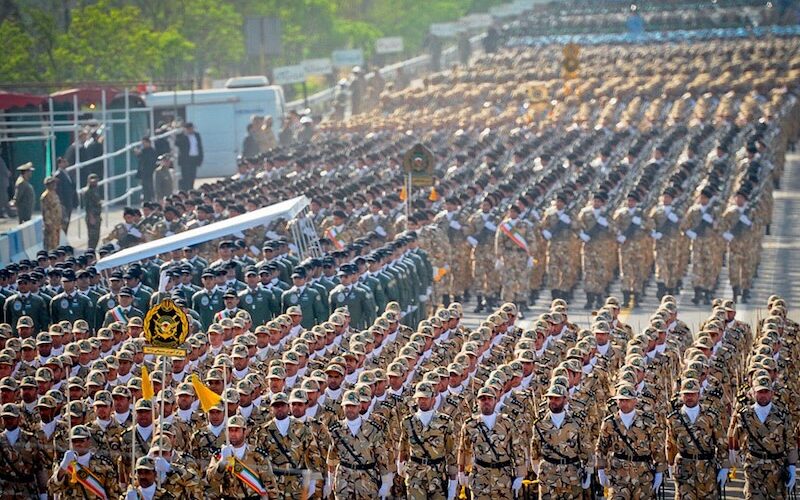As Iran retaliates, Israel contemplates its response. Cool heads and calm reflection are needed as the Middle East spirals towards full-scale war. Stuart McCarthy dissects the forever conflict.
Spectacular footage of Iranian missiles being intercepted by Israeli air defences in the night skies last weekend is only a portend of what’s at stake if Middle East tensions continue to spiral. As horrific as the human suffering in Gaza has been since October, there’s a risk of worse to come if cool heads don’t prevail. According to UN Secretary-General Antonio Guterres, there is now “a real danger of a devastating full-scale conflict.”
The trigger for Iran’s attacks on Saturday was Israel’s airstrike on the Iranian consulate in Damascus two weeks ago. Senior Iranian Revolutionary Guard Corps (IRGC) Quds Force commander Mohammad Reza Zahedi, seven other IRGC officers, five militiamen, one Hezbollah fighter, an Iranian advisor and two civilians were reported killed – a mother and a child – when an annex to the consulate was apparently destroyed by six guided missiles launched from Israeli air force F-35 warplanes on April 1. Iran’s Foreign Minister Hossein Amir-Abdollahian said:
Benjamin Netanyahu has completely lost his mental balance due to the successive failures in Gaza and his failure to achieve his Zionist goals.
A history of tension
Tensions between Israel, Iran, and other Middle East and Western actors involved in the escalation go back decades, pre-dating the emergence of Hamas and Al Qaeda’s September 11, 2001 attacks, which drew the West into a ‘global war on terror’ that shaped many of the current animosities.
This broader context is crucial in understanding how the Israel-Gaza conflict might reach a ceasefire or the prospects of an enduring two-state solution.
Equally, though, the war in Gaza may prove only a prelude of worse to come.
Western interests in the region have long revolved around the flow of oil to the global economy, a too-easily forgotten strategic vulnerability previously exploited by Middle East states in targeting the West’s support for Israel.
The Organisation of Arab Oil Exporting Countries’ embargo that triggered the first oil shock of 1973 was a response to western support for Israel during the fourth Arab-Israeli war. That war, in turn, was an attempt by Egypt and Syria to recover the territories lost to Israel during the third Arab-Israeli war in 1967. Those territories included the Golan Heights (Syria), the Sinai Peninsula (Egypt), and the Israeli-occupied territories of the West Bank and the Gaza Strip.
The second oil shock was a consequence of the 1979 Iranian Revolution. While the complex causes of that revolution remain the subject of debate, among them was a conservative backlash against the country’s secularisation of the Shah of Iran’s western-backed monarchy. The country is now a Shia Islamic theocracy.
The genesis of September 11 and the ensuing Afghanistan and Iraq wars is similarly complex, however among Al Qaeda’s grievances was the predominantly Sunni Arab states’ support of western military presence in the Middle East. Their main strategic objective was to provoke the West into invading the Holy Lands, thus sparking a popular Muslim uprising that would bring about regional or even global theocratic rule under a Wahhabi Caliphate.
The West obliged with its ill-fated 20-year military campaign in Afghanistan and the epic strategic blunder of invading Iraq on a false pretext. Among the outcomes of the latter was the rise of ISIS in Iraq, Syria and its affiliates elsewhere.
Status quo
Today’s Middle East instability – including the role of Islamist terrorism – is largely the result of western interventionism and strategic incompetence, even before we consider the specific question of the Israel-Palestine conflict.
As the West lost its way in a series of quagmires, Iran sought to bolster itself against the threat posed by Israel and its Western allies. Allegiances were forged with Hamas and other regional actors, motivated not necessarily by shared religious ideology but by shared strategic interests in countering Israel, its Western allies, and their Arab state enablers, including Saudi Arabia and Jordan.
Other allies include Hezbollah in Lebanon and, more recently, the Houthis in Yemen. Both have been designated as terrorist organisations by Western governments, each is estimated to have more than 100,000 fighters in addition to significant arsenals of conventional weapons.
Saturday night’s retaliatory missile strikes against Israel have been dismissed by some as a strategic miscalculation, a futile escalation easily thwarted by Israel’s sophisticated air defence systems.
To dismiss this event so lightly would be to fail to appreciate the broader context, the details of the attack and Iran’s obvious strategic interests.
Hamas’ importance
The name Hamas translates to “Islamic Resistance Movement.” The significance of the Iran-led strikes last weekend is that these are being heralded – even celebrated by some – as a transition from ‘shadow war’ to overt, conventional military confrontation by a more unified resistance against the Israeli occupation of Palestine.
In the case of Hamas, at least, this movement transcends Sunni-Shia sectarian interests. The movement now also seems prepared to defy western military support for Israel despite the high risks involved, evidenced by the Saudi and western bombing campaign against the Houthis in Yemen.
The resistance movement’s rhetoric has become popular among Western protesters who are pressuring their governments to withdraw support for Israel over concerns about violations of international humanitarian law in Gaza. Protest organisers are now using the explicit threat of “causing pain to the economy.”
Missile strikes no surprise
Saturday’s missile strikes, dubbed Operation True Promise by the IRGC, were telegraphed by Iran for a week. Not only did Iran forewarn Israel and the US, some reports suggest the IRGC also warned Jordan and other Arab states not to intervene “during the punitive attack against the Zionist regime.”
The aerial assault was preceded by the IRGC’s seizure of an Israeli-linked commercial vessel in the Strait of Hormuz, several days after the IRGC’s naval commander boasted of their ability to close the critical shipping lane. The prospect of an actual blockade triggering another global economic shock is one of the main reasons for western naval presence in the Persian Gulf, a subject we will return to in a moment.
According to Israeli and other military sources, the projectiles fired towards Israel on Saturday night included 170 drones, 30 cruise missiles and 110 ballistic missiles, launched from Iran, Iraq, Syria and Yemen. Iranian military leaders announced soon after the launches that this would end their retaliation for Israel’s attack on the Iranian consulate in Damascus if there was no further Israeli escalation.
Hezbollah said it also fired two barrages of rockets at an Israeli military base in the Golan Heights. Most of the Iranian projectiles appear to have been intercepted by Israeli air defences and aircraft from Israel, the US, the UK, France and Jordan. Among those reportedly destroyed by the US were a ballistic missile on its launcher and seven drones in Houthi-controlled areas of Yemen.
The drone and missile attacks apparently targeted Israeli military installations, including the Nevatim Air Force Base in southern Israel. Nevatim is home to Israel’s F-35 fighter jets, including those thought to be involved in the 1 April attack on the Damascus consulate. Four missiles reportedly struck the air base, A fifth was reportedly aimed at a military radar site in northern Israel but missed the target. One child was reportedly injured in southern Israel when an Iranian drone was intercepted overhead.
Iran’s strategy
While Israeli officials have played down any Iranian successes, several independent experts have suggested the strikes were ‘well calibrated’ by Iran. They wanted the strategic effect of retaliating for Israel’s attack on the consulate while deterring further escalation by Israel and minimising the risk of direct military intervention by the US and other Western allies. Ali Vaezoff of the International Crisis Group told CNN:
This attack crossed a psychological threshold. It’s the first time Iran is striking Israel directly from its own soil, but I think it was also an attack that was designed to be flashy but not fatal.
At time of writing. the Netanyahu war cabinet is reportedly engaged in a “heated debate” over how to respond, while the head of the Iranian military has said, “Our response will be much larger than [Saturday night’s] military action if Israel retaliates against Iran.” President Biden, Arab state leaders and other world leaders have called for Israel and Iran to de-escalate.
The stakes for escalation into full-scale war stretch well beyond the Middle East, including the possibility of another global economic shock. As concerned as many Australians may be for the civilian population of Gaza, such a shock would likely hit home in a way few yet appreciate. One-fifth of the world’s total oil consumption transits through the Strait of Hormuz, with Iran well placed to cause a major disruption using supersonic or hypersonic anti-ship missiles should it wish to do so.
Risk for Australia
Australia is one of the advanced Western economies most vulnerable to such a shock. The demand-led economy of the Covid-19 pandemic saw a decrease in national petroleum fuel consumption of as little as 7%, a decline accounted for mainly by the collapse in air travel, while the road transport sector remained functional.
Our near total dependence on imported oil and refined fuels, our long and vulnerable supply chains, and our negligence in failing to make the necessary preparations promise a significantly worse shock should a full-scale Middle East war break out.
While civil society’s efforts towards an Israel-Palestine ceasefire are laudable, those criticising the parties to this conflict from the comfort of their lounge rooms should perhaps reflect on how their own complacent dependence on a non-renewable resource contributes to the cycle of violence once again engulfing the region.
They might also contemplate life under the theocratic rule espoused by some of the conflict’s main actors. None of this is to diminish Israel’s atrocities in Gaza, but it should give pause to those cheering their favoured ‘side’ in a conflict threatening to spiral out of control.
Meanwhile, let’s hope cool heads prevail in the Middle East.
US isolated on Israel’s Gaza massacre – only nation to abstain UN ceasefire vote
Stuart McCarthy is a medically retired Australian Army officer whose 28-year military career included deployments to Afghanistan, Iraq, Africa, Indonesia and Papua New Guinea. Stuart is an advocate for veterans with brain injury, disabilities, drug trial subjects and abuse survivors. Twitter: @StuartMcCarthy_

